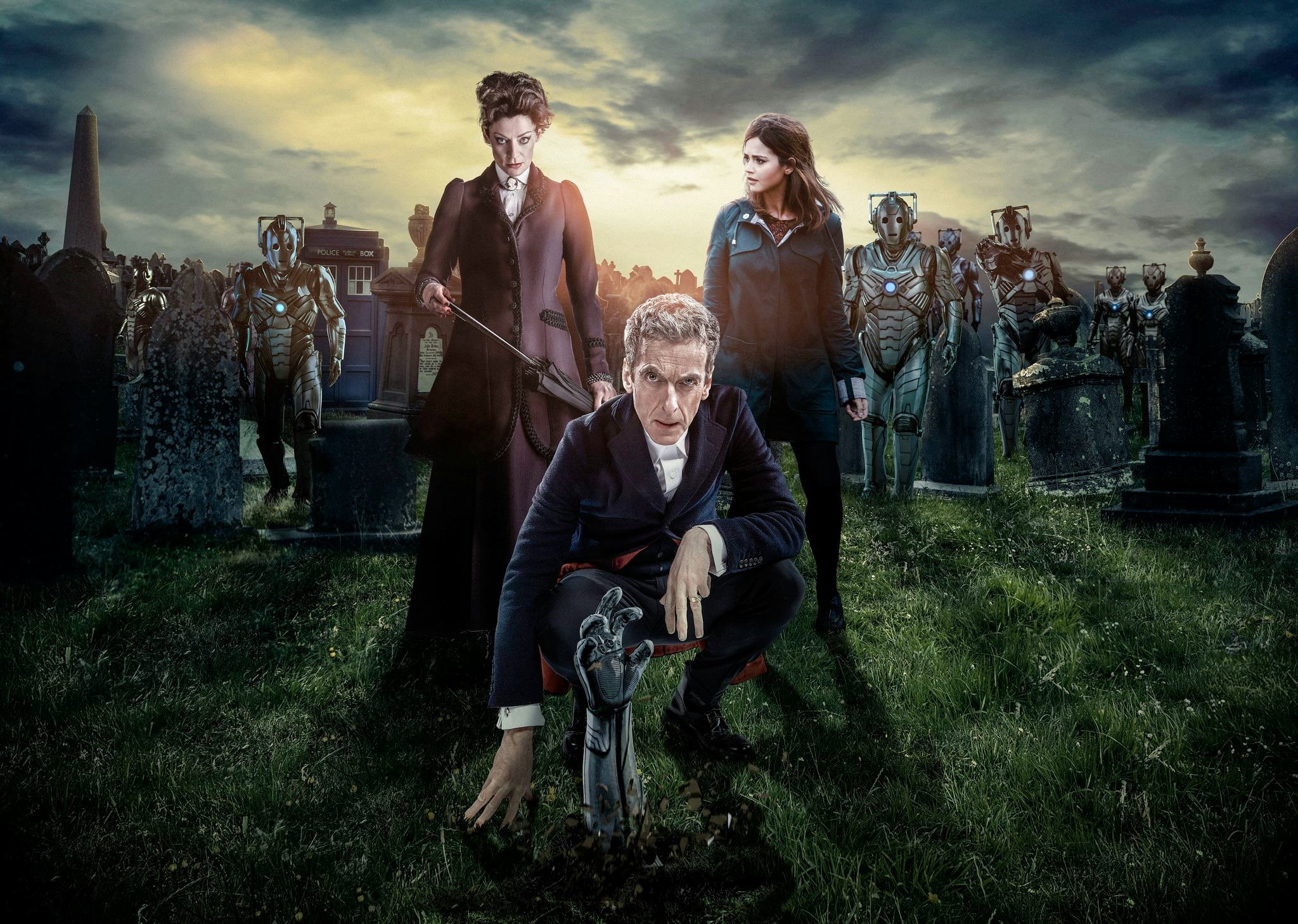
After the buoyant, uplifting ending of “The Day of the Doctor” in 2013, Doctor Who took a darker turn almost immediately. While Matt Smith’s era was characterized by much of the same relentlessly boyish charm as the first David Tennant era, Who shifted into more mature territory once Peter Capaldi emerged as the 12th Doctor. In his first season (2014’s Season 8), the 12th Doctor was moody, impatient, and disinterested in proving that he was a nice guy. But, throughout the season, the 12th Doctor was just as heroic as his previous incarnations, albeit a bit snarkier about it.
But the one thing the Doctor didn’t have during the Matt Smith era was a new version of the Master, and with one brilliant twist, in its two-part Season 8 finale, 10 years ago, Doctor Who changed the possibilities for who and what a Time Lord could be, forever.
Spoilers ahead.
Along with its predecessor, “Dark Water,” the story of “Death in Heaven” continues to explore the fallout of the accidental death of Danny Pink (Samuel Anderson), the paramour of Clara (Jenna Coleman), who the Doctor resented simply because he was a former solider. As previously established, Danny Pink had PTSD from his tours of duty with the military. In “Dark Water,” in what appeared to be the afterlife (called “The Nethersphere”) Danny Pink came face-to-face with a child that he accidentally killed when he was a soldier. There are few Doctor Who episodes with subjects this dark, and it’s relevant to note here that this concept was the set-up for what followed.
But the bigger revelation was that one of the season’s mystery boxes, a mysterious, Mary Poppins-esque character — who seemed to be collecting deceased characters throughout the season — was not just some new random character, but the only Time Lord that was as close to being as famous as the Doctor. At the end of “Dark Water,” she tells the Doctor, “You know who I am.” And after declaring herself Missy, she clarified, “I couldn’t very well keep calling myself, the Master, no could I?”
Before the Doctor changed from a male-presenting character (Peter Capaldi) to a female-presenting character (Jodie Whittaker), the events of “Dark Water” and “Death in Heaven,” pioneered what this kind of change could actually look like in Doctor Who. Yes, there had been plenty of support for a Time Lord swapping genders during regeneration before, and the 11th Doctore even alluded to this notion in the Season 6 episode “The Doctor’s Wife.” But before Missy, we’d never actually seen this happen. Less of a political statement, and more of a natural outgrowth of Doctor Who lore, Michelle Gomez’s Missy became perhaps one of the greatest things to happen to modern Who, and without a doubt is the best version of the Master in the 21st century (all apologies to John Simm and Sacha Dhawan). On the one hand, it was a revelation that the Master was now a woman, but what mattered more was that it was this woman.

What Gomez does so well in these episodes is sort of what people praise Kathryn Hahn for doing in Agatha All Along — play a boss witch who is both charming and terrifying. The difference is, unlike other contemporary TV characters who embody this trope, Gomez reminds us that Missy is utterly nuts, and an unpredictable homicidal maniac. The proof isn’t that she’s using dead human souls to make her own army, but that she also mercilessly zaps fan-favorite Osgood (Ingrid Oliver), letting viewers know that all that warm-and-fuzzy twee stuff from the Matt Smith era wasn’t safe. Missy was here to destroy, but also to remind us that Doctor Who could be a dangerous show.
“Death in Heaven” also features the grisly return of Danny Pink, now trapped in the body of a Cyberman who must fight his programing to save Clara, and in turn, the human race. Then-Who showrunner Steven Moffat would recycle this plot point two seasons later, in 2017’s “The Doctor Falls,” in which Bill Potts (Pearl Mackie) was also transformed into a Cyberman. In the Moffat era of Who, the worst thing that could happen wasn’t that a character would die tragically, but that they might live on and on, unable to find a fitting end to their life. This theme — of eternal but cursed living — repeats throughout the entire Capaldi era, most obviously in the Season 9 masterpiece “Heaven Sent.” Clearly, Moffat took the idea of the Doctor’s inherent immortality and decided to figure out all the ways that theme might be utterly depressing.
If we count both Osgood and Danny Pink as pseudo companions of the Doctor, “Death in Heaven” is one of the most hardcore episodes of the entire series, since both characters meet their apparent end in this episode, to say nothing of the premise of the episode itself. After Osgood was murdered by Missy here, she would return as her own Zygone clone (or was this the clone?) in Season 9. But, Danny Pink remained firmly dead after this episode concluded. And in nearly every way conceivable, his death was the Doctor’s fault.

In the Matt Smith era, the Doctor referred to himself as a “mad man with a box,” but in “Death in Heaven,” the Doctor calls himself an “idiot.” Underscored by the slightly moodier musical themes from Murray Gold, this “idiot with a box,” wasn’t the same kind of hero Doctor Who fans had been used to for the previous seven seasons. At the end of the episode, the Doctor learns that although he saved his home planet Gallifrey, the coordinates that Missy gave him were a lie. The episode ends with the Doctor bottling up his pain, and not telling Clara the truth: that he’s even more alone than ever.
All of this would set the stage for Season 9 in 2015, which remains one of the best Doctor Who seasons of all time. For those who believed that Peter Capaldi’s era got off to a rocky start in Season 8, the events of “Death in Heaven” weren’t designed to give anyone any comfort. Instead, thanks to an assist from Missy, Doctor Who journeyed into an even darker, and more realistic place, while expanding its canon possibilities at the same time. If this happy ending wasn’t really all that happy, what could possibly happen next?







